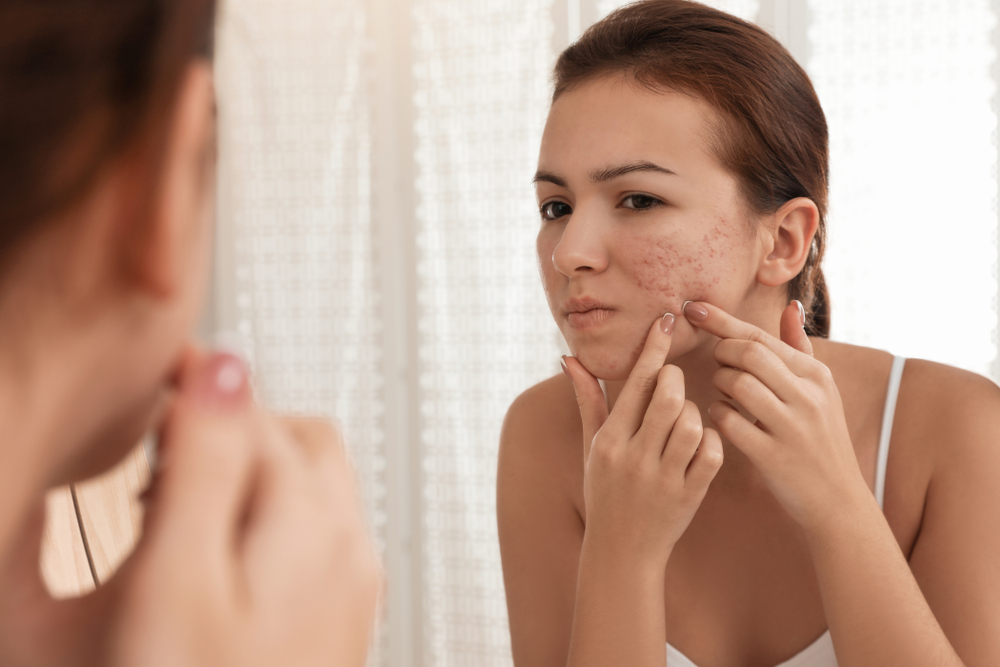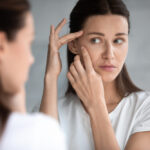
Have you ever looked in the mirror before an important event and noticed your skin seems to betray you at the worst possible time? Maybe a breakout shows up before a wedding, or your cheeks flush red with rosacea during a work presentation, or itchy hives suddenly appear after a sleepless week.
In moments like these, you might wonder whether your skin knows your secrets before anyone else does. What if your stress is not just in your mind, but also written on your skin for the world to see? This hidden mind-skin connection is powerful, and learning how to manage it can help you take back control not only of your health but also of your confidence.
How Stress Shows Up on Your Skin
Stress is not just an emotion. It triggers a cascade of chemical reactions throughout your body, and your skin often pays the price. When you are anxious or overwhelmed, your body releases cortisol, also known as the stress hormone. In small doses, cortisol is helpful because it prepares you for challenges, but when stress becomes chronic, cortisol stays elevated, and your skin begins to respond in ways that may feel unpredictable.
Acne is one of the most common examples. Stress can increase oil production, which clogs pores and sets the stage for breakouts. Rosacea is another condition closely tied to stress, with flare-ups often linked to emotional triggers. For some people, stress can even result in hives or persistent itching, which can feel both physically uncomfortable and emotionally exhausting.
The frustrating part is that these flare-ups rarely appear at random. They often arrive during the times when you want to look and feel your best. Understanding how stress affects the skin is the first step toward breaking this cycle and finding lasting relief.
Why the Mind-Skin Connection Matters
Your skin is the largest organ of your body, but it is also one of the most sensitive. It communicates constantly with your nervous system and immune system, meaning emotional stress can translate directly into physical symptoms. This is often why people describe their skin as a reflection of what is happening inside.
When your stress levels rise, inflammation increases, your immune defenses shift, and your skin barrier becomes less effective. That combination can lead to redness, dryness, or a sudden flare of an existing condition. For people already living with rosacea, eczema, acne, or psoriasis, the effects can feel even more pronounced.
This connection between the mind and the skin matters because it reframes how we approach treatment. Instead of viewing dermatologic flare-ups as random or superficial, we can see them as part of a broader picture of overall health. Stress management is not just about calming your mind, it is about creating real change in how your skin feels and looks.
Stress-Linked Conditions You Might Notice
Not everyone experiences stress on their skin in the same way. For some, it might be a breakout, while others develop patches of redness or persistent itching. Here are some of the most common stress-linked conditions:
- Acne: Elevated cortisol increases oil production, which clogs pores and fuels inflammation.
- Rosacea: Emotional stress can cause blood vessels to dilate, leading to redness and visible flushing.
- Hives: Stress may cause the immune system to release histamines, which create itchy, raised welts.
- Psoriasis and Eczema: These chronic conditions can worsen during times of stress, leading to more frequent flare-ups.
- Hair Shedding: Though not always immediate, prolonged stress can disrupt the hair growth cycle, leading to noticeable thinning months later.
Each of these conditions has unique triggers, but stress is a common thread. Knowing this can help you understand your own skin patterns and begin to manage them from within.
A Closer Look at the Science
Stress is more than a feeling; it is a biological chain reaction. Cortisol and adrenaline flood the system, increasing inflammation and changing how your immune system responds. These stress hormones weaken the skin barrier, making it harder for your skin to retain moisture and protect against irritants. That is why many people notice their skin feels more sensitive or reactive during difficult times.
Another layer of complexity comes from lifestyle. Stress often disrupts sleep, alters eating habits, and reduces the time we spend on self-care. A professional dermatologist in Montgomery County can attest to the large impact that each of these factors has on your skin health.
A lack of sleep, for example, increases dark circles and slows the body’s ability to repair itself. High-sugar comfort foods can spike insulin levels, worsening acne. Put all these together, and the stress-skin loop becomes clearer. The good news is that by managing stress and taking small but consistent steps, you can interrupt this cycle.
Practical Ways to Break the Stress-Skin Cycle
Coping with stress does not have to mean sweeping life changes overnight. Often, small adjustments repeated over time create the biggest improvements. If you have ever noticed that your skin feels calmer after a good night’s sleep or a quiet walk, you already understand how simple changes can make a difference.
Here are some practical methods to support your skin from within:
- Mindfulness and Meditation: Just a few minutes of deep breathing or guided meditation can lower cortisol levels.
- Consistent Sleep Routines: Going to bed and waking up at the same time helps regulate hormones and allows skin to repair.
- Balanced Nutrition: Eating nutrient-rich foods, especially those high in antioxidants, supports skin resilience.
- Physical Activity: Movement reduces stress hormones and improves circulation, which benefits skin appearance.
- Professional Support: Talking with a dermatologist can provide both topical and oral solutions that address flare-ups directly.
By combining these lifestyle practices with dermatologic care, you give your skin the best chance to calm and heal.
Table: Stress, Skin Symptoms, and Supportive Solutions
| Stress-Linked Condition | How It Appears on Skin | Coping Strategies | Dermatologic Support |
| Acne | Breakouts, clogged pores, inflammation | Balanced diet, exercise, stress reduction | Topical retinoids, prescription acne care |
| Rosacea | Redness, flushing, visible blood vessels | Mindfulness, avoiding known triggers | Laser treatments, topical therapies |
| Hives | Itchy welts, sudden rash | Relaxation techniques, antihistamines | Dermatologist-guided treatment plans |
| Eczema | Dry, itchy patches, flare-ups | Moisturizers, gentle cleansers, stress control | Prescription creams, light therapy |
| Psoriasis | Scaly, inflamed patches | Consistent routines, reduced stress | Biologic treatments, advanced therapies |
This table highlights how everyday coping strategies and dermatologic support can work hand in hand, offering both short-term relief and long-term solutions.
Why Sleep Is a Game-Changer for Your Skin
One of the most overlooked yet powerful ways to manage stress-related skin problems is through sleep. During sleep, your body goes into repair mode, producing growth hormones that help restore skin cells and strengthen your barrier. Without enough rest, inflammation rises, collagen breaks down more quickly, and your skin shows signs of fatigue.
If you find yourself struggling with sleep due to stress, creating a wind-down routine can help. Turning off screens an hour before bed, keeping your room cool and dark, and setting a consistent bedtime are simple yet effective strategies. Over time, these small adjustments can translate into healthier skin and a calmer mind.
The Role of Nutrition in Calming Skin
Food is another major player in the stress-skin relationship. High-sugar or processed foods may feel comforting during anxious moments, but they can worsen inflammation and acne flare-ups. Instead, focusing on whole foods rich in vitamins and antioxidants can support your skin from within.
Think of foods like blueberries, leafy greens, salmon, nuts, and seeds as allies for both your skin and your mood. These foods lower inflammation, stabilize energy levels, and promote overall balance. Hydration is just as important. Drinking enough water helps maintain skin elasticity and flush out toxins that can contribute to breakouts.
Mindfulness: Training the Skin Through the Mind
It might sound surprising, but mindfulness practices have been shown to reduce flare-ups of stress-related skin conditions. Studies reveal that meditation can lower cortisol, reduce inflammation, and even improve skin barrier recovery.
Mindfulness does not have to mean sitting in silence for hours. It can be as simple as taking three deep breaths before answering a stressful email, practicing yoga for ten minutes, or keeping a gratitude journal. These small shifts in perspective not only calm the mind but also give your skin space to recover.
Dermatologic Solutions That Support You
While lifestyle changes are powerful, professional dermatologic support provides targeted care when flare-ups happen. Dermatologists can recommend treatments tailored to your specific condition, whether it is prescription creams, laser therapy for rosacea, or acne scar removal in Montgomery County.
What matters most is that you do not have to navigate this stress-skin cycle alone. Combining medical expertise with daily practices creates a comprehensive approach. This ensures that while you are managing stress internally, your skin is also receiving the support it needs externally.
Living With Confidence in Your Skin
The real goal of managing stress and skin health is not perfection. Everyone has days when their skin feels less than ideal, but learning how to manage triggers gives you back a sense of control. Confidence grows not from flawless skin but from understanding your body’s signals and responding to them with care.
Taking small steps toward stress management, from sleep to nutrition to professional support, helps you feel more comfortable in your skin and more grounded in your daily life. Over time, you may notice fewer flare-ups, but even more importantly, you will notice a greater sense of peace.
Keeping a Clear Outlook on Stress
Stress will always be a part of life, but it does not have to define your skin. Whether you are managing acne, rosacea, hives, or other stress-related conditions, you have options. By recognizing the powerful connection between your mind and skin, you can shift from frustration to empowerment.
Simple changes like practicing mindfulness, prioritizing sleep, and eating nourishing foods create a foundation of wellness. Paired with expert dermatologic care, these habits can transform how your skin looks and feels. If you’re ever unsure what’s causing your skin breakouts, tied to stress or otherwise, get in touch with our experts at Pennsylvania Dermatology Specialists
The next time you notice your skin reacting during a stressful week, remember it is not just coincidence. Your body is speaking, and with the right tools, you can listen, respond, and move forward with confidence in your skin and in yourself.





